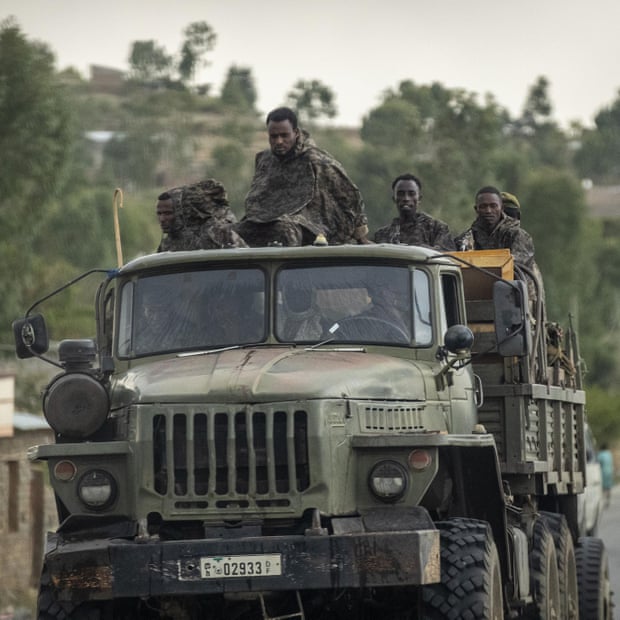Ethiopia has lifted a five-month suspension of the Norwegian Refugee Council’s aid work after it cleared the organisation of allegations of spreading “misinformation”.
The government ordered the NRC, along with Médecins Sans Frontières (MSF), to stop work for three months in July, including operations in the Tigray conflict zone. Both organisations were ordered to stop their humanitarian work in July but while MSF’s suspension was lifted in October, the NRC’s was extended.
“It is heart-breaking that we were unable to reach our target of serving more than half a million in need across Ethiopia in 2021,” Jan Egeland, NRC secretary general, said in a statement.
“Now that we have to restart, it will take time to again reach as many people as we did before the suspension. We have lost many of our staff. We urgently need permits for our international staff to return, and we need to be able to pay our suppliers.”
NRC said it was given a “strict warning” from the government over future advocacy on humanitarian needs.
Q&AWho is fighting the war in Ethiopia?
Show

Ethiopian National Defence Forces
Ethiopia's national military is one of the biggest standing armed forces in Africa, with an estimated 140,000 personnel. Its air force has fighter jets and armed drones.
The ENDF has considerable battle experience, fighting wars with Eritrea, quelling rebellions and confronting Islamist militants in Somalia.
Tigrayan rebels
The TPLF dominated the political alliance that ruled Ethiopia for nearly 30 years until anti-government protests swept Prime Minister Abiy Ahmed to power in 2018.
At the outset of fighting the TPLF had a large paramilitary force and well-trained local militia possibly numbering 250,000 men in total.
They were battle-hardened, having led the struggle that toppled Ethiopia's autocratic regime in 1991 and fighting a brutal border war with Eritrea.
Oromo fighters
The Oromo Liberation Army, an insurgent group bent on overthrowing Abiy, has linked up with the TPLF on the battlefield. Ethiopia declared the TPLF and OLA terrorist organisations in May, helping nudge the historic foes towards an unlikely military pact against their common enemy.
The OLA broke off from the Oromo Liberation Front, an opposition party that spent years in exile but was allowed to return to Ethiopia after Abiy took office.
Believed to number in the low thousands, it is fighting for self-determination for the Oromo, Ethiopia's largest ethnic group. OLA combatants have longstanding grievances with ethnic Amharas, and Abiy's government has accused the OLA of massacres.
Amhara forces
Regular and irregular combatants from Amhara have been a major ally of government forces since the war began. These militias occupied areas of southern Tigray and seized the region's fertile west, which ethnic Amharas consider part of their homeland.
Over the last year, ethnic Amharas have been returning to western Tigray and occupying abandoned homes and farmland in a state-backed campaign the United States has described as "ethnic cleansing".
Amharas claim western Tigray was stolen from them decades ago when the TPLF ruled the country. Their involvement in the conflict has fanned ethnic hostilities.
As the TPLF has advanced further into the region, Amhara leaders have warned their very existence is at stake and urged locals to join the fight.
Eritrea
Tigray borders Eritrea, whose leader Isaias Afwerki is close to Abiy and a sworn enemy of the TPLF, which ruled Ethiopia when both countries fought their border war.
For months, Addis Ababa and Asmara flatly denied the presence of Eritrean troops in Tigray, despite persistent eyewitness testimony to the contrary. Abiy finally acknowledged their presence in March and said their departure was imminent. But they remain in Tigray and it is unclear whether Abiy could make them leave - or afford to let them go. Agence France-Presse
NRC had been providing food, clean water, shelter, education and legal help to 25,000 people when it was ordered to suspend its operations.
At the time, the UN called the bans “dangerous” and said Ethiopia needed evidence to back up its claims that the aid groups were spreading misinformation.
MSF was banned in the Tigray, Gambella, Amhara and Somali regions. Along with spreading misinformation, the organisation was accused of bringing in satellite communication equipment without authorisation and not getting the correct permits for employees.
In September the organisation said the suspension had forced it to discharge patients from clinics at short notice, and meant it could not help people affected by the Tigray conflict, refugees from South Sudan and people suffering from neglected tropical diseases.
MSF said that while the three-month suspension had been lifted in late October, it had been difficult to restart operations.
“Although we are permitted to resume our work, it has not been possible to restart those medical programmes, mainly due to the current security situation and administrative obstacles,” the spokesperson said.
In November, MSF was forced to suspend work in some parts of the country for safety reasons.
“Despite the significant scale of humanitarian needs faced by the Ethiopian people in many regions of the country, MSF considers it difficult to restart and expand its response to address those needs.”
MSF said it was talking with the government and other parties to find ways to continue providing medical services.
